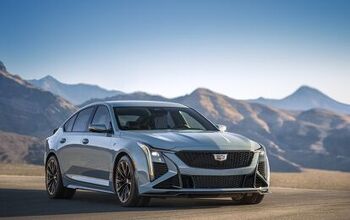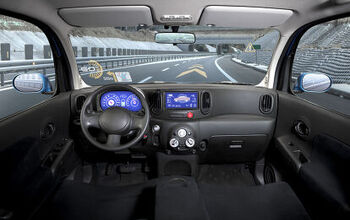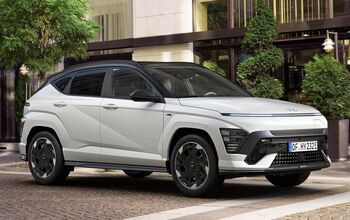QOTD: Is Subaru Now A Mainstream Automaker? And If So, Is That A Good Thing?
A band is only cool until everybody knows it’s cool.
Subaru, long a niche automaker with unique product offerings and limited geographic appeal, has tripled its U.S. market share over the last decade. Subaru will likely sell more than 650,000 new vehicles in the U.S. this year. The Subaru Outback and Forester are among America’s 12 most popular utility vehicles. And in a shrinking car market, U.S. sales of the Subaru Impreza — a newly launched compact for 2017 — are up 41 percent so far this year.
Subaru just dropped a new, fifth-gen Impreza 5-door in my driveway for a week-long test. It’s quite clearly the best Impreza ever: quiet, refined, solid, sufficiently powerful. The driver’s door armrest is plush. The car itself is — and we’re talking about an Impreza here — quite attractive.
The 2017 Subaru Impreza is, to be frank, normal. It doesn’t sound like a thrummy flat-four is present under the hood. The seating position doesn’t put your hips and feet on the same level. The windows have frames. There are other people driving the same car.
Has Subaru become a mainstream automaker? And if so, has some of Subaru’s appeal been lost?
Yes, and no.
This is 2017, not 2007. With nearly 4 percent market share, Subaru isn’t just any ol’ alternative punk rock band. Subaru is singing from the Top 40 song sheet. Somebody that I used to know called me maybe under my umbrella.
But that doesn’t mean Subaru isn’t still sending power to all four wheels virtually across-the-board. The engines are still Boxers, even though the Impreza’s 2.0-liter doesn’t sound like one. The traditional sedan body style accounts for a mere fraction of the brand’s sales.
Subaru is clearly still Subaru. But will the brand’s massive popularity uptick undo the Subaru spell?
Timothy Cain is the founder of GoodCarBadCar.net and a contributing analyst at The Truth About Cars and Autofocus.ca. Follow on Twitter @timcaincars.
More by Timothy Cain
Latest Car Reviews
Read moreLatest Product Reviews
Read moreRecent Comments
- Varezhka I have still yet to see a Malibu on the road that didn't have a rental sticker. So yeah, GM probably lost money on every one they sold but kept it to boost their CAFE numbers.I'm personally happy that I no longer have to dread being "upgraded" to a Maxima or a Malibu anymore. And thankfully Altima is also on its way out.
- Tassos Under incompetent, affirmative action hire Mary Barra, GM has been shooting itself in the foot on a daily basis.Whether the Malibu cancellation has been one of these shootings is NOT obvious at all.GM should be run as a PROFITABLE BUSINESS and NOT as an outfit that satisfies everybody and his mother in law's pet preferences.IF the Malibu was UNPROFITABLE, it SHOULD be canceled.More generally, if its SEGMENT is Unprofitable, and HALF the makers cancel their midsize sedans, not only will it lead to the SURVIVAL OF THE FITTEST ones, but the survivors will obviously be more profitable if the LOSERS were kept being produced and the SMALL PIE of midsize sedans would yield slim pickings for every participant.SO NO, I APPROVE of the demise of the unprofitable Malibu, and hope Nissan does the same to the Altima, Hyundai with the SOnata, Mazda with the Mazda 6, and as many others as it takes to make the REMAINING players, like the Excellent, sporty Accord and the Bulletproof Reliable, cheap to maintain CAMRY, more profitable and affordable.
- GregLocock Car companies can only really sell cars that people who are new car buyers will pay a profitable price for. As it turns out fewer and fewer new car buyers want sedans. Large sedans can be nice to drive, certainly, but the number of new car buyers (the only ones that matter in this discussion) are prepared to sacrifice steering and handling for more obvious things like passenger and cargo space, or even some attempt at off roading. We know US new car buyers don't really care about handling because they fell for FWD in large cars.
- Slavuta Why is everybody sweating? Like sedans? - go buy one. Better - 2. Let CRV/RAV rust on the dealer lot. I have 3 sedans on the driveway. My neighbor - 2. Neighbors on each of our other side - 8 SUVs.
- Theflyersfan With sedans, especially, I wonder how many of those sales are to rental fleets. With the exception of the Civic and Accord, there are still rows of sedans mixed in with the RAV4s at every airport rental lot. I doubt the breakdown in sales is publicly published, so who knows... GM isn't out of the sedan business - Cadillac exists and I can't believe I'm typing this but they are actually decent - and I think they are making a huge mistake, especially if there's an extended oil price hike (cough...Iran...cough) and people want smaller and hybrids. But if one is only tied to the quarterly shareholder reports and not trends and the big picture, bad decisions like this get made.


































Comments
Join the conversation
A couple of years ago Consumer Reports said that they've found that Subarus use more oil as they age than other brands. Then I read someplace else (maybe here) that they use "low tension" piston rings, presumably to reduce friction. Can anybody comment on this? Oil consumption doesn't bother me much but could it also mean more gas blowby? That would bother me more.
Subaru died a little, in the UK at least, when they replaced their iconic rally-bred Impreza with a generic looking hatchback that looked like a previous generation Kia.